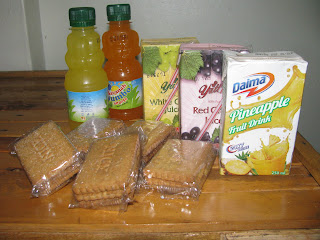Mumbere
Joshua
Alex
There are estimated to be thousands of street boys on the
streets in Kampala. You can spot them when you walk through the areas of the
city where they stay. Their clothes are dirty and most often torn. They rarely
have shoes and so they walk barefoot on the hard hot ground that doubles as
sidewalk beside the roads. If they are not there you can often see them
sleeping in the shade of whatever they can find, stretched out on their burlap
sack. This sack is their livelihood and they guard it well. They wander the
streets every day looking for scrap to fill the sacks with. At the end of the
day they take it to be weighed. They may get 5,000 Ugandan Shillings, about the
equivalent of 2 Canadian dollars, for a full bag. Often they work in groups.
Kids as young as 6 wander free without parents or a home. Kampala is by my
standard a filthy city, but it would be so much worse without the street kids.
They pick through the piles of garbage at the side of the road for the things
that can be salvaged. They glean the cast off bottles, bit of metal, and parts
of electronics. They wade into the open flowing sewer systems to fish out what
they can after a rain. The grossness of the open sewers does not seem to bother
them very much, after all it is where they bath anyways...
This kind of life may sound awful, and the reality is that
it is, but still most the boys prefer it to the life they had before making the
streets their home. So often at the street program that I work at I wish that I
did not have the language barrier when talking to the boys. Their English is
all quite broken, enough to make a connection, but a very surface on. Slowly I
have started to recognize that faces of the 70 some boys that come to program.
Slowly I have begun to memorize their names. But I want to hear their stories.
I hear bits and pieces from the Uncles and Aunties who work
at the program. I have read the written records of the boys that we have at our
homes. Many of these street boys are from broken homes where poverty and abuse
was rampant. Often step-parents have no love for children of another partner.
They beat them for small misbehaviours like not bring water home from the well
fast enough. Actual parents are often equally abusive. As a sign or rebellion
and desperation the kids run away and head for the city where they disappear
into the 1.7 million people that make up Kampala.
Poverty, lack of education, faulty family structures, abuse.
These are all issues surrounding the problem of street kids in Uganda.
Sometimes at the street program I look out over the boys and feel like I am
looking out over a sea of injustice. Their faces are visible in the waters, and
all round them swell the issues that have led to their life on the streets.
Deep, dark, swirling issues that are churning, and pulling, and crashing
against the shore. These boys are stuck in the middle. And I am stuck on the
shore looking out at them wishing I had the power to say "peace be
still." There is no simple fix.
I came across this article he other day as I was trying to
better educate myself. It is a bit old now, written in 2005, but still relevant.
It is very long, but a somewhat interesting read. The point of the article is
to look at the government’s response to street kids. Kamparengisa is still the
way street boys are dealt with and already I have heard horror stories about
this place. It gives a pretty good background on Uganda and the issue of street
kids.
I will end with a quote from a book I have been reading
called "Good News about Injustice" by Gary A. Haugen.
"In a matter of second we can go from knowing next to
nothing about children in India to knowing that fifteen million of them are
enslaved in short, brutal, dead-end lived of bonded servitude [or in my case
the thousands of street kids in Kampala]. Now what? In our hearts we feel like
a deer frozen by headlights. The very information that should move us is so
overwhelming that is actually paralyzes. It is like a big meal that is supposed
to provide fuel for our body but actually makes us feel like lying down and
taking a nap. Instead of energizing us for action, the overwhelming injustice
in our world actually makes us feel numb. We sense our hearts melting and our
feet sinking into concrete. This is when we need to listen to the voice of
Jesus, the Jesus who encourages the paralytic to "take heart" (Matthew
9:22). When their spirits were crippled by the sheer weight of the world's
injustice Jesus tells his disciples, "take heart! I have overcome the
world" (John 16:33)."
I have been struggling with this feeling of numbness the
last few weeks. The injustice here can be so overwhelming. And I feel
powerless. I really do. But then I realize my hope is not based on myself, but
in something greater. There is one who can say to the waves of injustice
"peace by still." And he is the one that has called me, has called
us, to take a stand against the injustice that is around us and to hope.
I guess for me now that means knowing the faces and the
names of the street boys here. It means trying to learn their stories and to
show them love. And for now, that is enough.






















